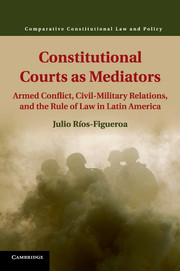 Constitutional Courts as Mediators
Constitutional Courts as Mediators Book contents
- Frontmatter
- Dedication
- Contents
- List of Figures
- List of Tables
- Acknowledgments
- 1 Constitutional Courts and the Armed Forces
- 2 A Theory of Constitutional Courts as Mediators
- 3 Constitutional Jurisprudence on Military Autonomy in Colombia, 1958–2013
- 4 Constitutional Jurisprudence on Military Autonomy in Peru, 1979–2013
- 5 Constitutional Jurisprudence on Military Autonomy in Mexico, 1917–2013
- 6 Judicial Regulation of the Use of Force in Colombia, Peru, and Mexico
- 7 Constitutional Courts as Mediators beyond Latin America
- 8 Constitutional Courts and Democratic Confl ict Solving
- References
- Index
1 - Constitutional Courts and the Armed Forces
Published online by Cambridge University Press: 05 May 2016
- Frontmatter
- Dedication
- Contents
- List of Figures
- List of Tables
- Acknowledgments
- 1 Constitutional Courts and the Armed Forces
- 2 A Theory of Constitutional Courts as Mediators
- 3 Constitutional Jurisprudence on Military Autonomy in Colombia, 1958–2013
- 4 Constitutional Jurisprudence on Military Autonomy in Peru, 1979–2013
- 5 Constitutional Jurisprudence on Military Autonomy in Mexico, 1917–2013
- 6 Judicial Regulation of the Use of Force in Colombia, Peru, and Mexico
- 7 Constitutional Courts as Mediators beyond Latin America
- 8 Constitutional Courts and Democratic Confl ict Solving
- References
- Index
Summary
Modern states need a corps of armed forces strong enough to provide security against external threats as well as to guarantee internal peace. But strong armies have also proven to be a threat to the regime and, specifically, to democratic stability, weakening the state and harming thousands of people. Powerful armies subordinated to democratic civilian governments are the puzzling exception where people with guns obey people without them (Przeworski 2011, 180). But how to create armed forces bounded by the democratic rule of law without jeopardizing its sprit de corps or its efficacy? In 1780 Thomas Jefferson said, “The freest governments in the world have their army under absolute government. Republican form and principles are not to be introduced into government of an army.” Absolutism is no longer an ideal model for organizing armed forces. True, they require strict discipline and a corporatist identity to work efficiently. But a history of military abuses, both within the armed forces as well as carried out by them, warns against prioritizing efficiency at the expense of accountability. Still the conundrum remains: How to obtain simultaneously the seemingly incompatible goals of having strong and efficacious militaries subjected to the rule of law?
Civilian governments and their armed forces clash over this quandary (cf. Barany 2012). When the dilemma is not dealt with successfully, an extreme outcome may be a coup d’état. Even if the generals seize power in the name of the rule of law “taking upon themselves the moral duty of deposing the illegitimate government,” as the Chilean generals led by Augusto Pinochet declared in justifying the 1973 military takeover, coups kill the democratic rule of law. The balance of authoritarian forces may produce something that resembles the engine force of constitutionalism (Barros 2002), or the courts may attempt to square the circle shedding some legality upon the usurpers (Mahmud 1994), but the democratic rule of law simply does not mix well with military regimes. The recent examples of the brief democratic interlude in Egypt interrupted by a military coup in 2013, or the coup d’état in Thailand in 2014, confirm that democracy dies the day of the coup, despite the statements and press releases of the generals.
- Type
- Chapter
- Information
- Constitutional Courts as MediatorsArmed Conflict, Civil-Military Relations, and the Rule of Law in Latin America, pp. 1 - 17Publisher: Cambridge University PressPrint publication year: 2016


